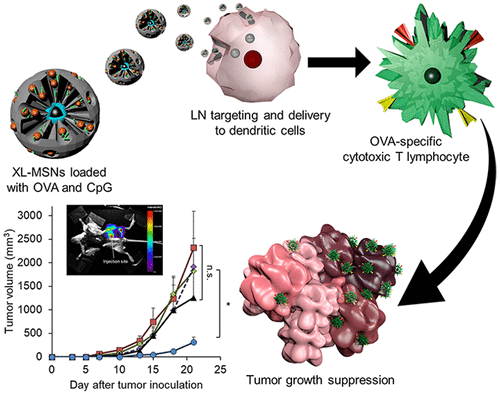当前位置:
X-MOL 学术
›
ACS Cent. Sci.
›
论文详情
Our official English website, www.x-mol.net, welcomes your
feedback! (Note: you will need to create a separate account there.)
Extra-Large Pore Mesoporous Silica Nanoparticles Enabling Co-Delivery of High Amounts of Protein Antigen and Toll-like Receptor 9 Agonist for Enhanced Cancer Vaccine Efficacy
ACS Central Science ( IF 12.7 ) Pub Date : 2018-03-28 00:00:00 , DOI: 10.1021/acscentsci.8b00035 Bong Geun Cha , Ji Hoon Jeong , Jaeyun Kim
ACS Central Science ( IF 12.7 ) Pub Date : 2018-03-28 00:00:00 , DOI: 10.1021/acscentsci.8b00035 Bong Geun Cha , Ji Hoon Jeong , Jaeyun Kim

|
Cancer vaccine aims to invoke antitumor adaptive immune responses to detect and eliminate tumors. However, the current dendritic cells (DCs)-based cancer vaccines have several limitations that are mostly derived from the ex vivo culture of patient DCs. To circumvent the limitations, direct activation and maturation of host DCs using antigen-carrying materials, without the need for isolation of DCs from patients, are required. In this study, we demonstrate the synthesis of extra-large pore mesoporous silica nanoparticles (XL-MSNs) and their use as a prophylactic cancer vaccine through the delivery of cancer antigen and danger signal to host DCs in the draining lymph nodes. Extra-large pores of approximately 25 nm and additional surface modification of XL-MSNs resulted in significantly higher loading of antigen protein and toll-like receptor 9 (TLR9) agonist compared with conventional small-pore MSNs. In vitro study showed the enhanced activation and antigen presentation of DCs and increased secretion of proinflammatory cytokines. In vivo study demonstrated efficient targeting of XL-MSNs co-delivering antigen and TLR9 agonist to draining lymph nodes, induction of antigen-specific cytotoxic T lymphocytes (CTLs), and suppression of tumor growth after vaccination. Furthermore, significant prevention of tumor growth after tumor rechallenge of the vaccinated tumor-free mice resulted, which was supported by a high level of memory T cells. These findings suggest that mesoporous silica nanoparticles with extra-large pores can be used as an attractive platform for cancer vaccines.
中文翻译:

超大孔介孔二氧化硅纳米粒子,可共同递送大量蛋白抗原和Toll样受体9激动剂,增强癌症疫苗的功效
癌症疫苗旨在唤起抗肿瘤适应性免疫反应,以检测和消除肿瘤。但是,当前基于树突状细胞(DC)的癌症疫苗存在一些局限性,这些局限性主要来自离体DC的培养。为了克服这些限制,需要使用携带抗原的材料直接激活和成熟宿主DC,而无需从患者体内分离DC。在这项研究中,我们证明了超大孔介孔二氧化硅纳米颗粒(XL-MSNs)的合成及其通过将癌症抗原和危险信号传递到引流淋巴结中的宿主DC用作预防性癌症疫苗的用途。与传统的小孔MSN相比,大约25 nm的超大孔和XL-MSN的额外表面修饰导致抗原蛋白和Toll样受体9(TLR9)激动剂的负载明显增加。体外研究显示DC的激活和抗原呈递增强,促炎细胞因子的分泌增加。体内研究表明,将共同传递抗原和TLR9激动剂的XL-MSNs有效靶向排空的淋巴结,诱导了抗原特异性细胞毒性T淋巴细胞(CTL),并在接种疫苗后抑制了肿瘤的生长。此外,对接种的无肿瘤小鼠进行肿瘤再攻击后,显着预防了肿瘤生长,这得到了高水平的记忆T细胞的支持。这些发现表明,具有超大孔的中孔二氧化硅纳米粒子可以用作癌症疫苗的诱人平台。
更新日期:2018-03-28
中文翻译:

超大孔介孔二氧化硅纳米粒子,可共同递送大量蛋白抗原和Toll样受体9激动剂,增强癌症疫苗的功效
癌症疫苗旨在唤起抗肿瘤适应性免疫反应,以检测和消除肿瘤。但是,当前基于树突状细胞(DC)的癌症疫苗存在一些局限性,这些局限性主要来自离体DC的培养。为了克服这些限制,需要使用携带抗原的材料直接激活和成熟宿主DC,而无需从患者体内分离DC。在这项研究中,我们证明了超大孔介孔二氧化硅纳米颗粒(XL-MSNs)的合成及其通过将癌症抗原和危险信号传递到引流淋巴结中的宿主DC用作预防性癌症疫苗的用途。与传统的小孔MSN相比,大约25 nm的超大孔和XL-MSN的额外表面修饰导致抗原蛋白和Toll样受体9(TLR9)激动剂的负载明显增加。体外研究显示DC的激活和抗原呈递增强,促炎细胞因子的分泌增加。体内研究表明,将共同传递抗原和TLR9激动剂的XL-MSNs有效靶向排空的淋巴结,诱导了抗原特异性细胞毒性T淋巴细胞(CTL),并在接种疫苗后抑制了肿瘤的生长。此外,对接种的无肿瘤小鼠进行肿瘤再攻击后,显着预防了肿瘤生长,这得到了高水平的记忆T细胞的支持。这些发现表明,具有超大孔的中孔二氧化硅纳米粒子可以用作癌症疫苗的诱人平台。











































 京公网安备 11010802027423号
京公网安备 11010802027423号